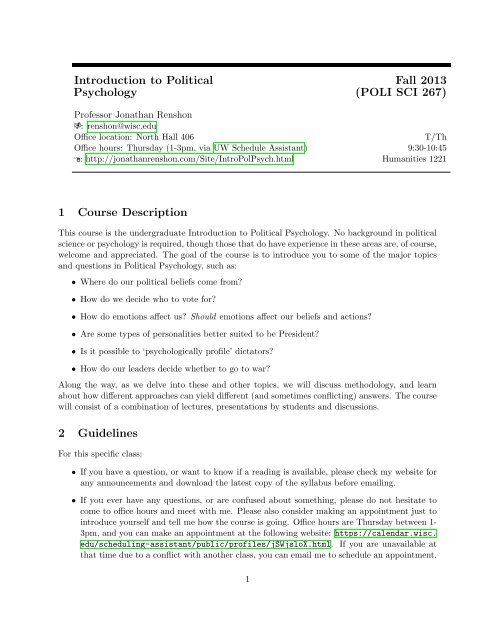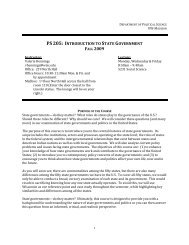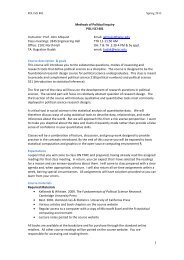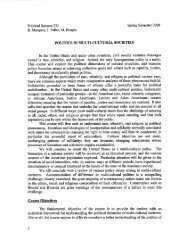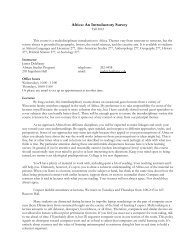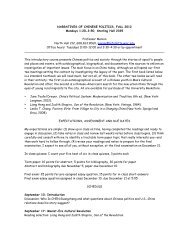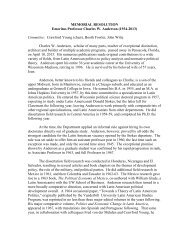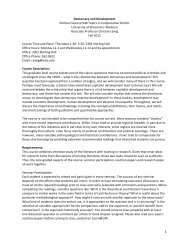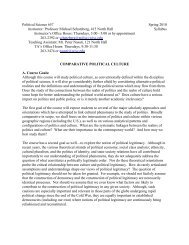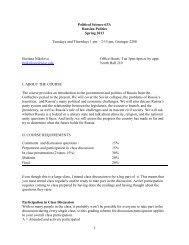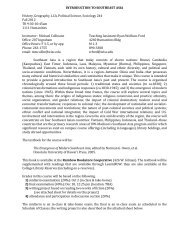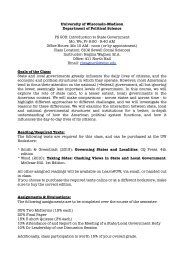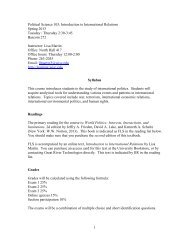PS 267 Intro to Political Psychology.pdf - Department of Political ...
PS 267 Intro to Political Psychology.pdf - Department of Political ...
PS 267 Intro to Political Psychology.pdf - Department of Political ...
- No tags were found...
You also want an ePaper? Increase the reach of your titles
YUMPU automatically turns print PDFs into web optimized ePapers that Google loves.
<strong>Intro</strong>duction <strong>to</strong> <strong>Political</strong> Fall 2013<strong>Psychology</strong> (POLI SCI <strong>267</strong>)Pr<strong>of</strong>essor Jonathan Renshon: renshon@wisc.eduOffice location: North Hall 406T/ThOffice hours: Thursday (1-3pm, via UW Schedule Assistant) 9:30-10:45: http://jonathanrenshon.com/Site/<strong>Intro</strong>PolPsych.html Humanities 12211 Course DescriptionThis course is the undergraduate <strong>Intro</strong>duction <strong>to</strong> <strong>Political</strong> <strong>Psychology</strong>. No background in politicalscience or psychology is required, though those that do have experience in these areas are, <strong>of</strong> course,welcome and appreciated. The goal <strong>of</strong> the course is <strong>to</strong> introduce you <strong>to</strong> some <strong>of</strong> the major <strong>to</strong>picsand questions in <strong>Political</strong> <strong>Psychology</strong>, such as:• Where do our political beliefs come from?• How do we decide who <strong>to</strong> vote for?• How do emotions affect us? Should emotions affect our beliefs and actions?• Are some types <strong>of</strong> personalities better suited <strong>to</strong> be President?• Is it possible <strong>to</strong> ‘psychologically pr<strong>of</strong>ile’ dicta<strong>to</strong>rs?• How do our leaders decide whether <strong>to</strong> go <strong>to</strong> war?Along the way, as we delve in<strong>to</strong> these and other <strong>to</strong>pics, we will discuss methodology, and learnabout how different approaches can yield different (and sometimes conflicting) answers. The coursewill consist <strong>of</strong> a combination <strong>of</strong> lectures, presentations by students and discussions.2 GuidelinesFor this specific class:• If you have a question, or want <strong>to</strong> know if a reading is available, please check my website forany announcements and download the latest copy <strong>of</strong> the syllabus before emailing.• If you ever have any questions, or are confused about something, please do not hesitate <strong>to</strong>come <strong>to</strong> <strong>of</strong>fice hours and meet with me. Please also consider making an appointment just <strong>to</strong>introduce yourself and tell me how the course is going. Office hours are Thursday between 1-3pm, and you can make an appointment at the following website: https://calendar.wisc.edu/scheduling-assistant/public/pr<strong>of</strong>iles/jSWjsloX.html. If you are unavailable atthat time due <strong>to</strong> a conflict with another class, you can email me <strong>to</strong> schedule an appointment.1
• You are responsible for the readings listed under each class.• If you are not presenting that class, then you are not responsible for reading the PresentationReadings, unless specifically noted (you will get an email reminder in theses cases).• In terms <strong>of</strong> exams, you are responsible for all <strong>of</strong> the all <strong>of</strong> the readings and anything discussedin class. Thus, you may be asked about something in the Presentation Reading if it wasdiscussed in class.• If you have a disability or circumstance that could affect your performance, please contactme early in the semester so that we can consider accommodations. The McBurney Centerfor Disability Services can provide <strong>of</strong>ficial documentation <strong>of</strong> disabilities.• Obviously, academic misconduct is not <strong>to</strong>lerated. Please make sure you are familiar with thepolicies outlined by the Dean <strong>of</strong> Students.Some basic guidelines for this class (these probably apply <strong>to</strong> any class you take):• Do the readings in preparation for each class. If you miss one, don’t ignore it and move on,but make an effort <strong>to</strong> catch up.• Come <strong>to</strong> class on time.• It’s fine <strong>to</strong> use a computer <strong>to</strong> take notes, but please don’t bring your computer so you canwrite emails and read the news during class (it’s much more obvious than you realize).• There are legitimate reasons <strong>to</strong> have <strong>to</strong> miss class, but if you must, please email me ahead <strong>of</strong>time <strong>to</strong> let me know.• If you have any questions about anything related <strong>to</strong> the course, email me and I will do mybest <strong>to</strong> get back <strong>to</strong> you within 24 hours.• One exception: I will not respond <strong>to</strong> emails sent the night before an assignment is due orbefore a midterm or final exam.3 Assignments1. Keep up with the readings and be prepared <strong>to</strong> discuss them in class.2. Sign up for one presentation slot. For that slot, you will be responsible for:(a) carefully reading the designated Presentation Reading(b) presenting it <strong>to</strong> the class (in about 5-6 minutes). Feel free <strong>to</strong> use slides if you’d like,though if you’d like <strong>to</strong> do that, please come <strong>to</strong> class a few minutes early <strong>to</strong> set those up.(c) helping <strong>to</strong> lead a short discussion on your <strong>to</strong>pic2
(d) on the day <strong>of</strong> your presentation, turning in a short, 2-page response paper on thereading you are presenting. Your paper should briefly summarize the work in question,and then critique it (e.g. what would you have done differently if you wrote that paper?What questions did it raise that were particularly interesting? etc.). The paper shouldbe turned in as a (stapled) hard-copy <strong>to</strong> me during class on the day you present. If youare presenting as part <strong>of</strong> team <strong>of</strong> two people, you are each responsible for your own,individual (and not identical) response papers.3. Complete and turn in the two assignments during the semester. They are both (short!) onlinesurveys that you will take prior <strong>to</strong> the class where we discuss them.4 GradingYour final grade will be composed <strong>of</strong>:• 35% - Class Participation (includes presentation + response paper)• 25% - In-class Midterm• 40% - Final Exam5 Readings Used in the CourseJournal articles and edited book chapters - These are generally available through the UWLibrary website. If they are not accessible online, then there will be a clickable link on the syllabus.Textbooks- You may wish <strong>to</strong> purchase these, but readings will (unless noted) be available online.1. <strong>Intro</strong>duction <strong>to</strong> <strong>Political</strong> <strong>Psychology</strong> (2nd ed.), Martha L. Cottam, Beth Dietz-Uhler, ElenaMas<strong>to</strong>rs & Thomas Pres<strong>to</strong>n (Taylor & Francis, 2010).⇒ Abbreviation on list <strong>of</strong> reading(s): ITPP.2. <strong>Political</strong> <strong>Psychology</strong>: Key Readings, edited by John T. Jost & Jim Sidanius (Taylor & Francis,2004).⇒ Abbreviation on list <strong>of</strong> reading(s): PP.3. Oxford Handbook <strong>of</strong> <strong>Political</strong> <strong>Psychology</strong>, edited by David O. Sears, Leonie Huddy & RobertJervis (Oxford University Press, 2003).⇒ Abbreviation on list <strong>of</strong> reading(s): OHPP.3
Schedule1. <strong>Intro</strong>duction [September 3]• NO READINGS2. What is <strong>Political</strong> <strong>Psychology</strong>? [September 5]• ITPP Chapter 1: <strong>Political</strong> <strong>Psychology</strong>: <strong>Intro</strong>duction and Overview, pp. 1-12 [link]• What is <strong>Political</strong> <strong>Psychology</strong>? (2003), in <strong>Political</strong> <strong>Psychology</strong>, Mor<strong>to</strong>n Deutsch & CatarinaKinnvall; edited by Kristen Renwick Monroe (Lawrence Earlbaum Associates), pp.15-42 [link]3. How do you measure beliefs and perceptions? (I)? [September 10]• Experimental Methodology in <strong>Political</strong> Science (2002), Rose McDermott, <strong>Political</strong> Analysis10: 325-342• What do Labora<strong>to</strong>ry Experiments Measuring Social Preferences Reveal about the RealWorld (2007)?, Steven D. Levitt & John A. List, Journal <strong>of</strong> Economic Perspectives 21/2:153-174Presentation reading(s):(a) How Large and Long-lasting Are the Persuasive Effects <strong>of</strong> Televised Campaign Ads?Results form a Randomized Field Experiment (2011), Alan S. Gerber, James P. Gimpel,Donald P. Green & Daron R. Shaw, American <strong>Political</strong> Science Review 105/1: 135-150(b) Tes<strong>to</strong>sterone and Aggression in a Simulated Crisis Game (2007), Rose McDermott, DominicJohnson, Jonathan Cowden & Stephen Rosen, ANNALS <strong>of</strong> the American Academy<strong>of</strong> <strong>Political</strong> and Social Science 614/1: 15-334. How do you measure beliefs and perceptions (II)? [September 12]• A Practical Guide <strong>to</strong> the Comparative Case Study Method in <strong>Political</strong> <strong>Psychology</strong>(1999), Juliet Kaarbo & Ryan K. Beasley, <strong>Political</strong> <strong>Psychology</strong>, 20/2: 369-391.• The Evolution <strong>of</strong> Operational Code Analysis (1990), Stephen G. Walker, <strong>Political</strong> <strong>Psychology</strong>11/2: 403-4184
Presentation reading(s):(a) When Public Statements Reveal Private Beliefs: Assessing Operational Codes at a Distance(2009), Jonathan Renshon, <strong>Political</strong> <strong>Psychology</strong> 30/4: 649-6615. Where do <strong>Political</strong> Preferences Come from? [September 17]• Not Your Parents’ <strong>Political</strong> Socialization: <strong>Intro</strong>duction for a New Generation (2004),Virginia Shapiro, Annual Review <strong>of</strong> <strong>Political</strong> Science 7: 1-23• OHPP: Childhood and Adult <strong>Political</strong> Development, David O. Sears & Sheri Levy, pp.60-109 [link]• Biology, Politics and the Emerging Science <strong>of</strong> Human Nature (2008), James H. Fowler& Darren Schreiber, Science 322: 912-914Presentation reading(s):(a) Twin Studies <strong>of</strong> <strong>Political</strong> Behavior: Untenable Assumptions? (2008), Jon Beckwith &Corey A. Morris, Perspectives on Politics 6/4: 785-7916. Bounded Rationality (I): Rationality [September 19]• Rationality as Process and as Product <strong>of</strong> Thought (1978), Herbert A. Simon, AmericanEconomic Review 68/2: 1-16• <strong>Psychology</strong> and Rational Ac<strong>to</strong>r Theory (1995), Kristen Renwick Monroe, <strong>Political</strong> <strong>Psychology</strong>16/1: 1-21Presentation reading(s):(a) PP: Contrasting Rational and Psychological Analysis <strong>of</strong> <strong>Political</strong> Choice, George A.Quattrone & Amos Tversky, pp. 244-258 [link]7. Bounded Rationality (II): Biases & Heuristics [September 24]• ITPP (Part <strong>of</strong>) Chapter 3: Cognition, Identity, Emotions and Attitudes, pp. 39-43[link]• Bounded Rationality (1999), Bryan D. Jones, Annual Review <strong>of</strong> <strong>Political</strong> Science 2:297-3215
• A Perspective on Judgment and Choice: Mapping Bounded Rationality (2003), DanielKahneman, American Psychologist 58/9: 697-720Presentation reading(s):(a) Advantages and Disadvantages <strong>of</strong> Cognitive Heuristics in <strong>Political</strong> Decision Making(2001), Richard R. Lau & David P. Redlawsk, American Journal <strong>of</strong> <strong>Political</strong> Science45/4: 951-971.(b) Reconsidering the Rational Public: Cognition, Heuristics and Mass Opinion (2000), inElements <strong>of</strong> Reason: Cognition, Choice and the Bounds <strong>of</strong> Rationality, James H. Kuklinski& Paul J. Quirk; edited by A. Lupia, M.D. McCubbins & S.L. Popkin (CambridgeUniversity Press), pp. 153-182 [link]8. Priming and Framing [September 26]• Framing Theory (2007), Dennis Chong & James N. Druckman, Annual Review <strong>of</strong> <strong>Political</strong>Science 10: 103-126Presentation reading(s):(a) On the Limits <strong>of</strong> Framing Effects: Who Can Frame? (2001), James N. Druckman, Journal<strong>of</strong> Politics 63/4: 1041-1066(b) PP: Altering the Foundations <strong>of</strong> Support for the President Through Priming, John A.Krosnick & Donald R. Kinder, pp. 150-162 [link]9. Emotions (I): Individual Level/Background [Oc<strong>to</strong>ber 1]• Affect and Emotion (2009), in <strong>Political</strong> <strong>Psychology</strong>: Situations, Individuals and Cases,David Patrick Hough<strong>to</strong>n (Routledge), pp. 132-142 [link]• The Role <strong>of</strong> Affect in Decision Making (2003), in Handbook <strong>of</strong> Affective Science, GeorgeLoewenstein & Jennifer S. Lerner; edited by R. Davidson, H. Goldsmith & K. Scherer(Oxford University Press, NY), pp. 619-642 [link]Presentation reading(s):(a) The Feeling <strong>of</strong> Rationality: The Meaning <strong>of</strong> Neuroscientific Advances for <strong>Political</strong> Science(2004), Rose McDermott, Perspectives on Politics 2/4: 691-706(b) Emotion Priming and Attributions for Terrorism: Americans’ Reactions in a NationalField Experiment (2006), Deborah A. Small, Jennifer S. Lerner & Baruch Fisch<strong>of</strong>f, <strong>Political</strong><strong>Psychology</strong> 27/2: 289-2986
10. Emotions (II): Implications for the <strong>Political</strong> System [Oc<strong>to</strong>ber 3]• It’s My Campaign and I’ll Cry if I Want To: How and When Campaigns Use EmotionalAppeals (2011), Travis N. Ridout & Kathleen Searles, <strong>Political</strong> <strong>Psychology</strong> 32/3: 439-458• Affect as Information: The Role <strong>of</strong> Public Mood in <strong>Political</strong> Reasoning (2000), in Elements<strong>of</strong> Reason: Cognition, Choice and the Bounds <strong>of</strong> Rationality, Wendy M. Rahn ;edited by A. Lupia, M.D. McCubbins & S.L. Popkin (Cambridge University Press), pp.130-152 [link]Presentation reading(s):(a) Striking a Responsive Chord: How <strong>Political</strong> Ads Motivate and Persuade Voters by Appealing<strong>to</strong> Emotions (2005), Ted Brader, American Journal <strong>of</strong> <strong>Political</strong> Science 49/2:388-405.(b) Affect and Cognition in Party Identification (2005), Barry C. Burden & Casey A. Kl<strong>of</strong>stad,<strong>Political</strong> <strong>Psychology</strong> 26/6: 869-88611. Personality and Politics (I): Background and Big 5 [Oc<strong>to</strong>ber 8]⇒Assignment 1: Take online “Big 5” Personality Test. Available at: http://www.personalitytest.org.uk/• ITPP Chapter 2: Personality and Politics, pp. 13-36 [link]• The Big 5 Approach (2010), in Personality and the Foundations <strong>of</strong> <strong>Political</strong> Behavior,Jeffrey J. Mondak (Cambridge University Press), pp. 24-65 [link]Presentation reading(s):(a) The Big Five Personality Traits in the <strong>Political</strong> Arena (2011), Alan S. Gerber, GregoryA. Huber, David Doherty & Conor M. Dowling, Annual Review <strong>of</strong> <strong>Political</strong> Science 14:265-28712. Personality and Politics (II): Presidential Character and Personality [Oc<strong>to</strong>ber 10]• The Presidential Character (1993), in <strong>Political</strong> <strong>Psychology</strong>: Classic and ContemporaryReadings, James David Barber; edited by N.J. Kressel (Paragon House), pp. 127-137[link]7
• Classifying and Predicting Presidential Styles: Two ‘Weak’ Presidents (1968) James D.Barber, Journal <strong>of</strong> Social Issues 24/3: 51-80.Presentation reading(s):(a) Presidential Difference in the Early Republic: The Highly Disparate Leadership Styles<strong>of</strong> Washing<strong>to</strong>n, Adams and Jefferson (2006), Fred I. Greenstein, Presidential StudiesQuarterly 36/3: 373-390.13. Personality and Politics (III): The Authoritarian Personality and Social Dominance [Oc<strong>to</strong>ber15]• PP: The Authoritarian Personality and the Organization <strong>of</strong> Attitudes, Roger Brown,pp. 39-68 [link]• PP: The Other “Authoritarian Personality,” Bob Altemeyer, pp. 85-107 [link]• PP: Social Dominance Theory: A New Synthesis, Jim Sidanius and Felicia Prat<strong>to</strong>, pp.315-332 [link]Presentation reading(s):(a) The Authoritarian Personality, 50 Years Later: What Questions Are There for <strong>Political</strong><strong>Psychology</strong>? (2001), John Levi Martin, <strong>Political</strong> <strong>Psychology</strong> 22/1: 1-2614. FILM [Oc<strong>to</strong>ber 17]15. Personality and Politics (IV): Psychological Pr<strong>of</strong>iling <strong>of</strong> Leaders [Oc<strong>to</strong>ber 22]• Leader Personality Assessments in Support <strong>of</strong> Government Policy (2005) in The PsychologicalAssessment <strong>of</strong> <strong>Political</strong> Leaders, Jerrold M. Post; edited by Jerrold M. Post(University <strong>of</strong> Michigan Press, MI), pp. 39-61 [link]• Saddam Hussein: Personality Traits and Motivational Biases, Walter Weintraub andDavid Winter, pp. 367-374 [link]• Saddam Hussein: Beliefs and Integrative Complexity, Stephen G. Walker, Mark Schafer,Michael D. Young & Peter Suedfeld, pp. 387–398 [link]Presentation reading(s):8
(a) Saddam Hussein <strong>of</strong> Iraq: A <strong>Political</strong> <strong>Psychology</strong> Pr<strong>of</strong>ile, Jerrold M. Post, pp. 335-366[link]16. Midterm Review [Oc<strong>to</strong>ber 24]17. in-class midterm [Oc<strong>to</strong>ber 29]18. Ideology, Belief Systems and ‘Implicit’ Attitudes [Oc<strong>to</strong>ber 31]⇒ Assignment: Take online Implicit Association Test for Gender-Career. Available at:https://implicit.harvard.edu/implicit/selectatest.html• The Implicit Association Test at Age 7: A Methodological and Conceptual Review(2007), in Au<strong>to</strong>matic Processes in Social Thinking and Behavior, Brian A. Nosek, AnthonyG. Greenwald & Mahzarin R. Banaji; edited by J.A. Bargh (<strong>Psychology</strong> Press),pp. 265-292 [link]• PP: Does Ideology Exist?, pp. 177-180 [link]• PP: The Nature <strong>of</strong> Beliefs Systems in Mass Publics, Philip E. Converse, pp. 181-199[link]Presentation reading(s):(a) PP: Cognitive Style and <strong>Political</strong> Belief Systems in the British House <strong>of</strong> Commons,Philip E. Tetlock, pp. 230-240 [link](b) Attributions <strong>of</strong> Implicit Prejudice, or “Would Jesse Jackson ‘Fail’ the Implicit AssociationTest?” (2004), Hal R. Arkes & Philip E. Tetlock, Psychological Inquiry 15/4:257-27819. Values and Trade-<strong>of</strong>fs [November 5]• OHPP: Values, Ideology, and the Structure <strong>of</strong> <strong>Political</strong> Attitudes, Stanley Feldman, pp.477-510 [link]9
• Groupthink (1993), in <strong>Political</strong> <strong>Psychology</strong>: Classic and Contemporary Readings, IrvingJanis; edited by N.J. Kressel (Paragon House), pp. 360-366 [link]• Twenty-Five Years <strong>of</strong> Groupthink Theory and Research: Lessons from the Evaluation <strong>of</strong>a Theory (1998), Marlene E. Turner & Anthony R. Pratkanis, Organizational Behaviorand Human Decision Processes 73/3: 105-115Presentation reading(s):(a) Case Studies in Low-Quality Decision Making (2010) in Groupthink vs. High-QualityDecision-Making in International Relations, Mark Schafer and Scott Crichlow (ColumbiaUniversity Press, New York), pp. 81-122 [link]23. Elite Decision-Making & Prospect Theory [November 19]• ITPP Chapter 5: The Study <strong>of</strong> <strong>Political</strong> Leaders, pp. 101-130 [link]• Prospect Theory, Rational Choice and International Relations (1997) Jack S. Levy, InternationalStudies Quarterly 41/1: 87-112.Presentation reading(s):(a) Who Takes Risks? Daring and Caution in Foreign Policy Making (1997), Paul Kowert& Margaret Hermann, Journal <strong>of</strong> Conflict Resolution 41/5: 611-637.(b) Prospect Theory in International Relations: The Iranian Hostage Rescue Mission (1992)Rose McDermott, <strong>Political</strong> <strong>Psychology</strong> 13/2: 237-263.24. <strong>Psychology</strong> and International Relations (I): Background [November 21]• ITPP Chapter 12: The <strong>Political</strong> <strong>Psychology</strong> <strong>of</strong> International Security and Conflict, pp.293-316 [link]• OHPP: <strong>Political</strong> <strong>Psychology</strong> and Foreign Policy, Jack S. Levy, 253-284 [link]Presentation reading(s):(a) <strong>Psychology</strong> and International Relations Theory (2001), J.M. Goldgeier & Philip E. Tetlock,Annual Review <strong>of</strong> <strong>Political</strong> Science 4: 67-9225. <strong>Psychology</strong> and International Relations (II): Terrorism [November 26]11
• PP: The <strong>Psychology</strong> <strong>of</strong> <strong>Political</strong> Terrorism, Martha Crenshaw, pp. 411-431 [link]• The <strong>Psychology</strong> <strong>of</strong> Terrorism “Syndrome” Versus “Tool” Perspectives (2006), Arie W.Kruglanski & Shira Fishman, Terrorism and <strong>Political</strong> Violence 18: 193-215Presentation reading(s):(a) The Mind <strong>of</strong> the Terrorist: A Review and Critique <strong>of</strong> Psychological Approaches (2005),Jeff Vic<strong>to</strong>r<strong>of</strong>f, Journal <strong>of</strong> Conflict Resolution 49/1: 3-4226. <strong>Psychology</strong> and International Relations (III): Defining the Situation [December 3]• Metaphors and Foreign Policy Decision Making (1994), Keith L. Shimko, <strong>Political</strong> <strong>Psychology</strong>15/4: 655-671• The Role <strong>of</strong> Analogical Reasoning in Novel Foreign-Policy Situations (1996), DavidPatrick Hough<strong>to</strong>n, British Journal <strong>of</strong> <strong>Political</strong> Science 26/4: 523-552Presentation reading(s):(a) Impact <strong>of</strong> Analogical Reasoning on US Foreign Policy <strong>to</strong>wards Kosovo (2006), AidanHehir, Journal <strong>of</strong> Peace Research 43/1: 67-8127. <strong>Psychology</strong> and International Relations IV: Decision-Making in Wartime [December 5]• The Rubicon Theory <strong>of</strong> War: How the Path <strong>to</strong> Conflict Reaches the Point <strong>of</strong> No Return(2011), Dominic D.P. Johnson & Dominic Tierney, International Security, 36/1: 7-40.• War and Misperception (1988), Robert Jervis, Journal <strong>of</strong> Interdisciplinary His<strong>to</strong>ry 18/4:675-700Presentation reading(s):(a) A Cognitive Analysis <strong>of</strong> Japan’s 1941 Decision for War (1980), Ariel Levi & Philip E.Tetlock, Journal <strong>of</strong> Conflict Resolution 24/2: 195-211(b) Misperception and the Causes <strong>of</strong> War: Theoretical Linkages and Analytical Problems(1983), Jack S. Levy, World Politics 36/1: 76-9912
28. TBD [December 10]29. Review & Discussion <strong>of</strong> Final Exam [December 12]13


